Description
Farewell to Arms by Ernest Hemingway, one of history’s best-selling novels, best expresses the pain of the creator generation during World War I, and farewell to Arms is not just a war novel, but also a passionate love story.
Farewell to Arms tells the story of a young American named Frederick Henry who lives in northern Italy but World War I breaks out and he joins the army in the war and serves in an ambulance.
It becomes. Henry was wounded in the war and sent to a hospital in Milan for treatment.
In this situation, an interest arises between Henry and Catherine. Art that hates war goes to war again.
This book is one of the most brilliant novels of World War I, based on the author’s experiences. His artistic personality and what happens to him are very close to that of Ernest Hemingway in World War I.
The most important factor that distinguishes this novel from other Hemingway works is its ending, and according to the author, he had 36 different endings for the novel Farewell to Arms, which eventually became what you will read.
This book is one of the most famous works of Ernest Hemingway and is known as a memorable and unique masterpiece among literary lovers.
The book Farewell to Arms has been adapted several times, the most famous of which was directed by Frank Borsigi in 1932.
Selected sentences of the novel Farewell to Arms:
When you are in love, you like to do something for your love. You like to sacrifice. Do you long for service?
– We looked at each other in the dark. I thought it was very beautiful. I took her hand. Let me hold your hand. I put my arm under my arm.
– You are only mine. The fact is that you never belonged to anyone. But if you have been, it does not matter to me. I’m not afraid of them. But do not talk to me about them.
When a man spends time with a girl, when does that girl tell him what her salary is?
Farewell to the Book of Farewell to Weapons:
– amazing. (New York Times)
– An honorable ornament in American literature. (Washington Times)
Farewell to precious gem weapons. (NPR)
Get to know Ernest Hemingway better
Ernest Hemingway, the great American writer, was born in 1899. During World War I, he volunteered as an ambulance driver on the Italian front and returned to the United States with severe injuries.
In 1929, Hemingway wrote Farewell to Arms. Hemingway’s other book is The Old Man and the Sea, which earned him the Pulitzer Prize in 1953.
He also won the Nobel Prize in 1954 for his strong style in the art of storytelling.
Hemingway is a master writer who does not overlook the smallest detail of the scene and, with a strong sense of humor, describes his surroundings as if he were seeing a living story in front of him.
In a part of the book Farewell to Arms, we read:
When I returned to the front line, we were still living in the same house.
More weapons had been deployed in the surrounding villages, and spring had arrived. The fields were green and the vineyards were sprouting.
The trees along the street had small leaves and a gentle breeze was blowing from the sea.
I stared at the hills of the city, the old castle in the heart of it, the surrounding brown mountains, and the slightly green slopes.
There were more weapons in the city, more hospitals were built, people on the street clashed with English men and sometimes women;
Several other houses were also hit by mortars. The weather was warm and pleasant like spring, and I walked through the trees and the street that was alive with the light on the wall and realized that we still live in the same house. house remained exactly as I had left it.
Door was open and a soldier was sitting outside in the sun on a bench.
An ambulance was waiting at the side.
When I entered, there was the smell of marble and hospital. Everything seemed to be the same as when I left, except that it was spring.
I looked at the hall from the side of the room and saw the colonel sitting at his desk.
The window was open and the sun was shining inside. He did not see me, and I hesitated whether to go in and report to him, or to go upstairs and take a bath first. I decided to go upstairs.
Book Farewell to Guns Review
When we look at the literary masterpieces of the world, we realize that most of them are the narrative of wars and conflicts between countries and individuals;
It is as if no literary work would have been created without war and famine in the world!
The novel Farewell to Arms by Ernest Hemingway, one of the greats of literature, also narrates war and love together.
What is the story of the novel Farewell to Arms?
During World War I, an art lieutenant worked in the frontline ambulance department in a small town in northern Italy.
In the early days of the war, he enjoyed living in the dining hall and drinking between ambulances.
The war was so calm that he even agreed to leave for the whole winter.
When Henry returns to the front from vacation, he meets a nurse named Catherine Barkley and pretends to be interested in her.
Catherine accepts his words; While not believing it. In the meantime, however, the flames of war are rekindled and Henry is injured.
She was taken to a hospital in Milan, where Catherine was sent.
At the hospital, Catherine and Henry also fall in love. Henry is sent back to the battlefield. The war is getting worse every day, and Henry, talking to his comrades, realizes how much they all hate war.
Before Henry can reach the mountainous areas he has been sent to, the Germans and Austrians begin to attack and are forced to retreat.
Henry returns with three ambulances under his command, but the ambulances get stuck on the side roads.
One of his soldiers is killed and the other surrenders. Henry and another of his soldiers are arrested for retreating and set out on a meadow for trial and shooting. But along the way, Henry saves himself and escapes.
After this incident, he realizes that he has no interest in fighting.
Farewell to arms; Disgust of war
Many believe that Hemingway told the story of the book based on his personal experiences in World War I, and that the main characters of the book are based on real characters.
Catherine, for example, is based on a person named Agnes von Kurowsky, who was a Red Cross nurse during World War I and cared for Hemingway. Hemingway had fallen in love with her too.
The book tells the story of the battle of the Austro-Hungarian and German empires against Italy, which took place in 1917 and Italy was forced to withdraw extensively.
The book’s love story is described in a bitter and violent context. Hemingway narrates the story with his unique narrative style and eloquent prose, which has caused the reader to accompany the final pages of the book.
The author skillfully narrates the protagonist’s confusion and disgust with the war, and the splendor of his words and phrases doubles the value and beauty of the book.
“I remember living in the world of this book almost every day, thinking about what I was going to do with the rest of it and was happier than ever when I was creating this country, its people and its adventures,” the author said of his writing style.
I read the book every day from the beginning to where I wrote it. “Whenever I was satisfied with my job and knew where to start tomorrow, I would stop working again.”
Although the story is sad, Hemingway considers it inevitable and a fact of life:
“It did not bother me that the book was so sad. Because I believe that life is essentially a tragedy, and I knew there was only one way to end this story.
But the important thing was that you managed to write something like that, to create a work that you would feel comfortable reading, and more importantly, that you could do something enjoyable every day.
“It made me enjoy my work more than ever and not pay attention to the rest of the issues.”
One of the important reasons that the book has remained an important work all these years is to introduce a new level of pacifism. Also, the simple and fluent language of the book along with the multi-layered emotions have turned the work into a classic novel.
Hemingway’s anti-war novel on the big screen
In 1932, FAREWELL TO ARMS, starring Gary Cooper and Helen Hayes, was made. The film won the Academy Award for Best Editing and Best Sound at the Academy Awards.
In 1957, John Houston and Charles Vidor directed another adaptation of Hemingway’s novel of the same name. The film stars Rock Hudson and Jennifer Jones. The great Italian director Vittorio Desica was nominated for an Academy Award for Best Supporting Actor.
Introducing Ernest Hemingway; Founder of literary chronicle
Ernest Hemingway The great American writer Ernest Hemingway was born in 1899.
His high power in characterization and his simple writing style have earned him the title of the father of modern fiction. He first worked as a reporter for a local magazine, but at the age of 19 volunteered for World War I.
He could not join the army due to poor eyesight but was able to go to war as a Red Cross driver near the Italian front. During World War I, Hemingway was injured by a mortar shell near him and was hospitalized for a long time.
The novel Farewell to Arms is based on the life of the author in the same years.
Hemingway spent his entire life on adventures, from World War I to participating in the Spanish Civil War, tourist trips to the African wildlife, and hunting in Cuba.
These adventures greatly influenced his writings.
“The Sun Takes Time” is his first novel based on his experiences in Spain. The novel “The Old Man and the Sea” is his most important work, in which a new concept of consciousness is displayed and he introduces a new character who is very different from the hero of his previous books.
Hemingway won the Nobel and Pulitzer Prizes for The Old Man and the Sea.
Hemingway’s storytelling power is so great that when he was asked to write a short story, he narrated it in six words: “Sale: baby shoes; Never Covered “which was the beginning of” 6-word stories “.
Persian translations of the book Farewell to Arms
The first Persian translation of the book was done by “Najaf Daryabandari”. He translated books when he was only 23 years old.
After that, “Daryabandari” corrected the translated text of the book at different times. His translation is available in the market by “Scientific and Cultural”, “Niloufar” and “Amirkabir” publications.
“Hanieh Chupani” translated this work in 2013 in “Kolepashti” publishing house, which is written in modern language with Shiva prose. “Ali Akbar Yaghitbar” has edited the mentioned translation.
Kiomars Parsai translated Hemingway’s book into Persian in 2014. This translation was released by Naj.
In 2015, Art Parineh published a Persian translation of the book Farewell to Arms, translated by Hajar Zinivand.
In 2016, the book Farewell to Arms was translated by Mehdi Afshar and published by Beh Sokhan Publications.
parts of the book Farewell to Arms we read:
At the end of the summer of that year, we lived in a house in a village with a river, gravel, and rubble in the sun, dry and white. Water was clear and moving softly, and blue where the duct was deep.
Soldiers passed by the river on the road and the dust they picked up sat on the leaves of the trees. The trunks of the trees were also dusty.
That year the leaves soon began to fall, and we saw the army moving along the road, dust rising, and the leaves falling with the breeze, and the soldiers leaving, leaving behind a bare white road, and Only leaves can be seen on the road …
I understood how their brains work, if they had brains and if it worked! They were all young men and they were saving their country …
from the major upstairs, they were executing the officers who had been separated from their men … we were standing in the rain and they were taking us one by one, interrogating us and They were shooting.
The interrogators had the fairness and fairness of those who deal with death without threatening them. They were interrogating a colonel of the entire army regiment …
And now some time had passed and I had not seen anything sacred and the things that were proud had no honor and the victims were like Chicago food warehouses that did not work with a meat creature except to bury it …
A farewell to arms is one of Ernest Hemingway’s most famous and well-written works.
Hemingway, who lived from 1899 to 1961, wrote the novel Farewell to Arms at the age of thirty (1929), which immediately became a bestseller. To the extent that many people recognize Hemingway as the author of Farewell to Arms.
The book is a first-person narrative, and we are introduced to the story of the presence of an American named Frederick Henry in World War I on the Italian front.
Much of the story of saying goodbye to guns takes place in Italy and Switzerland.
Farewell to arms is usually praised for its clear and effective narrative of war.
Some critics attribute such influential descriptions to Hemingway’s presence in World War I and his direct experience of war.
However, he apparently experienced the war on the Italian front for only a few weeks as the driver of the Red Cross ambulance.
The book Farewell to Arms – from which several films and plays have been adapted – has been translated in Iran by Najaf Daryabandari and published by various publishers (including Niloufar, Scientific and Cultural Publishing, and Amir Kabir).
The following are excerpts from the book Farewell to Arms:
I asked, “What do you really think about war?”
“I think it’s stupid.”
“Who wins the war?”
“Italy.”
“Why?”
“These are a younger nation.”
“Do younger nations always win wars?”
“They deserve to win for a while.”
“What happens next?”
“Then they become an older nation.”
Once in the camp, I set fire to a log.
The stump was full of ants.
As soon as it started to burn, a large number of ants came out;
First they went to the middle where the fire was burning;
Then they returned and fled to the bottom.
When they gathered enough at the bottom of the stump, they fell into the fire.
Some were falling,
Their tension was burnt and flattened, and so they went,
And they did not know where they were going.
But most of them went to the fire and then to the bottom of the stump and eventually fell into the fire.
I remember that valley at that time I thought that this is the end of the world and it is a good opportunity to become a Christ and take the stump out of the fire and throw it out.
So that the ants can reach the ground.
But I did nothing.
Except I sprayed a cup of water on the stump so that the cup was empty and I could pour another drink into it.
I think splashing a cup of water on the burning stump only made the ants steam.
1- Introducing the book on YouTube
2- Introducing the book in Aparat

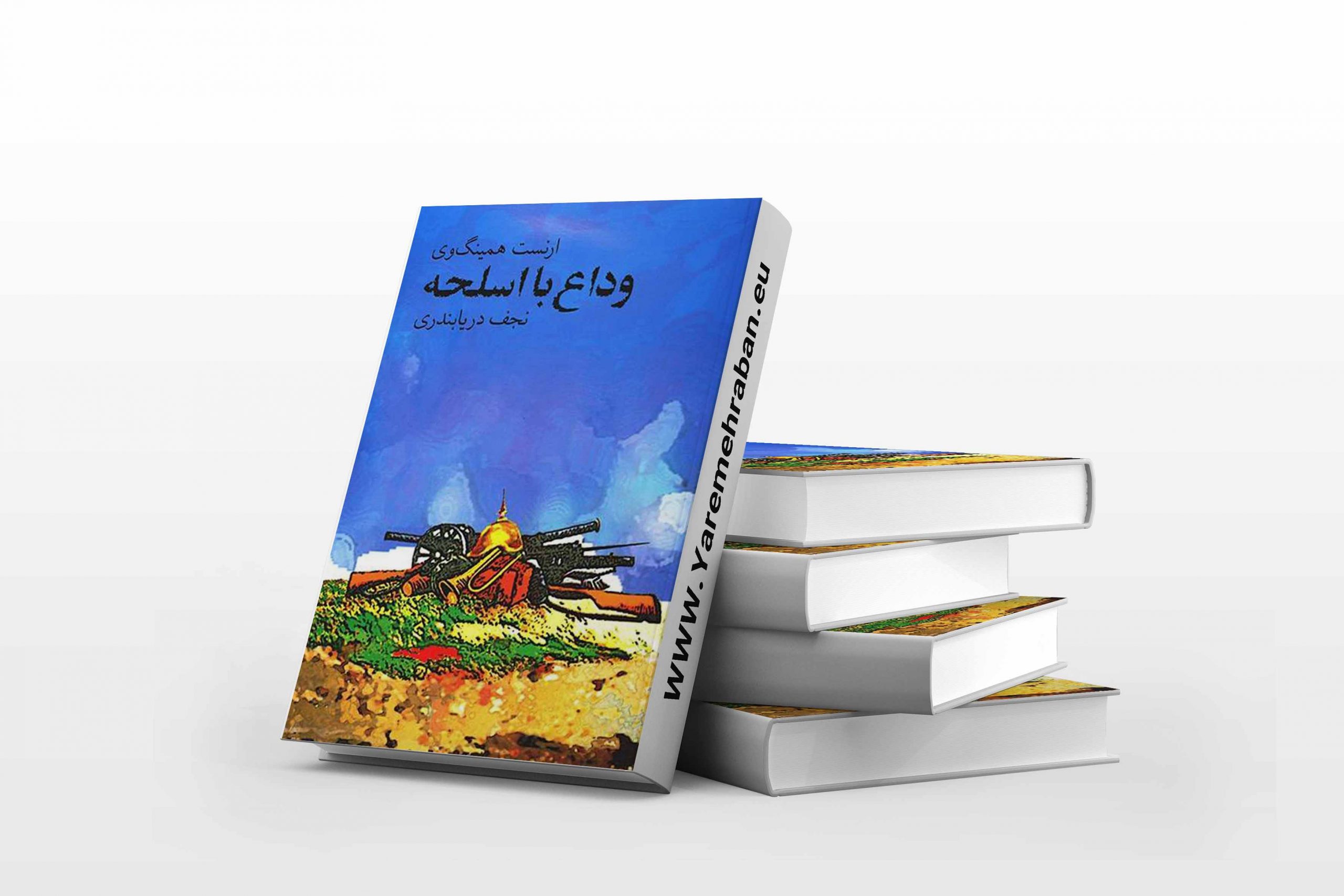
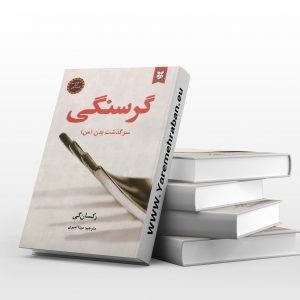





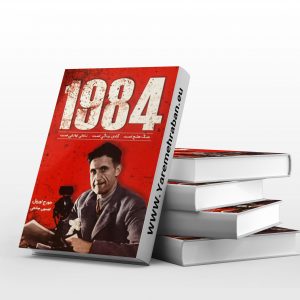
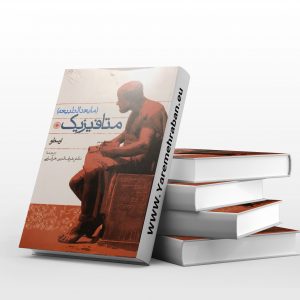

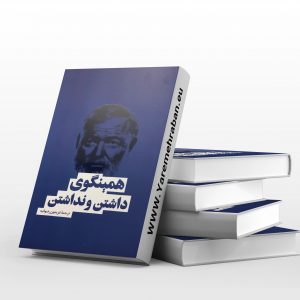

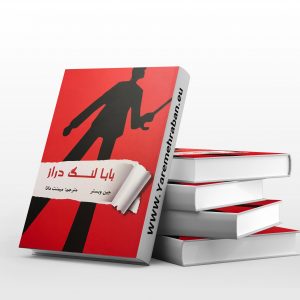
Reviews
There are no reviews yet.